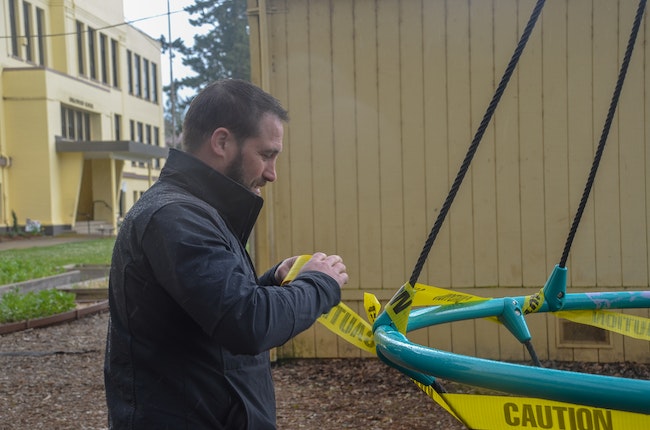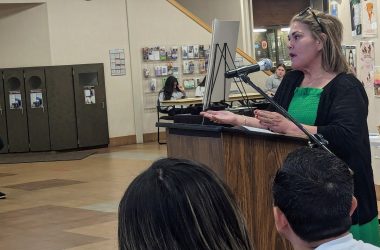
Jesse Davis, Salem-Keizer School District security field coordinator, tapes off the Englewood Elementary School playground on March 23, 2020 (Rachel Alexander/Salem Reporter)
NOTE: Salem Reporter is providing free access to its content related to the coronavirus as a community service. Subscriptions are vital to sustain this service. Please join us.
No one in Salem is going to jail for not staying six feet away from other people – not right away, at least.
Law enforcement agencies say they are going to work on educating those who haven’t gotten the word that Gov. Kate Brown is ordering everyone stay home as the state tries to corral the novel coronavirus. She is allowing people to go to work, go shopping for necessities and even go out for a hike – as long as it’s not as part of a group.
The governor is making a violation of her order a crime – a misdemeanor punishable by up to 30 days in jail and a fine of up to $1,250.
The Salem Police Department and Marion County Sheriff’s Office said they plan to increase patrols around the community and encourage voluntary compliance with the new regulations.
“Our hope is people will understand the need to follow the guidance of our public health experts and maintain social distance and limit activities to the essentials. Yet, arrest or referral to the appropriate state agency is possible for those who flagrantly refuse to follow the order,” Salem Police Chief Jerry Moore said Monday after the order was issued.
Sgt. Jeremy Landers, Marion County Sheriff’s Office spokesman, said deputies intend to educate and encourage people to do the right thing for the greater good of the community.
“Our deputies will be focused on being visible in the community. In situations like this, it’s important we work together for voluntary compliance,” Landers said.
Polk County Sheriff Mark Garton said deputies will start by educating people and insist they leave illegal gatherings. He said the worst-case scenario would be to cite them.
“It serves no purpose to send them to jail,” he said.
He said his deputies aren’t going to actively patrol playgrounds, but if a deputy sees someone violating the ban they will “talk to them about ‘this is why we’re doing this,’ people will most likely comply,” Garton said.
The Oregon State Police is taking the same approach – educate and then enforce.
But there are fewer places for people to go with the governor’s order.
Across the area, playgrounds are suddenly off limits.
Salem is installing signs at its 91 parks indicating closures of “playground equipment, restroom facilities, sports courts, skate parks, drinking fountains and splash fountains…All dog parks are also closed.” The city is also removing picnic tables from shelters and pavilions.
The restrictions will be in place until April 28, the city announced Monday afternoon.
City spokeswoman Kathy Ursprung said residents can still walk in the park, but must maintain a six-foot distance from others.
Perry Davis, a skateboarder who frequents skate parks in the Salem area, said the governor’s decision to close them was “a bummer.”
He’s been skating daily and said he’s seen more people skating in recent days as the weather warmed up.
“People have definitely been like more on edge about being around others,” he said in a text when asked about social distancing. “Skate parks aren’t a very big area for people to gather so when it did get busy it was kinda hard to distance yourself from others.”
Marion County spokeswoman Jolene Kelley said the county plans to install construction fencing around playgrounds at Labish Village, Denny, Spong’s Landing and Scotts Mills parks Tuesday morning.
At Highland Elementary School, the adjoining playground was nearly empty Monday afternoon. Dangling chains on tetherball poles clanged as a slight wind blew them around.
Three middle schoolers and a Highland student clustered on the play structure, talking, around 2 p.m. They said they weren’t aware of the closure and wanted to get out of the house because they were bored.
Jesse Davis, Salem-Keizer’s security field coordinator, wrapped yellow caution tape around the play structures at Englewood Elementary School. He said facilities workers were taping off playgrounds around the district, prioritizing schools where meals are being distributed.
Englewood adjoins a city park with another play structure which was still open around 2:30 p.m. Signs on both sides of the playground in English and Spanish urged parents to protect children’s health by staying three to six feet away from others, throwing tissues away promptly and washing or sanitizing hands after play.
All district playgrounds with a fence or other enclosure will be locked, district spokeswoman Lillian Govus said Monday. Those that can’t be locked will be taped off.
The governor’s order also is going to make it harder to get government services. Brown directed state agencies to close their buildings as much as possible. How that will work will vary agency to agency, state officials said. What’s clear is more business than ever will be done by phone and email as more public employees worked in locked offices or telecommute from home.

The Oregon Capitol Mall was closed to the public on Tuesday, March 24, following an order from Gov. Kate Brown (Rachel Alexander/Salem Reporter)
In Salem, the Capitol was already closed and so was the State Capitol State Park, the mall park popular this time of year for the cherry blossoms. On Tuesday, the surrounding area, normally bustling with state workers on a weekday morning, was quiet, with ample parking available around state government buildings.
The governor’s order closes state buildings under the executive branch “to the maximum extent possible,” requiring agencies to deliver services online or by phone. When in-person interactions must occur, the directive requires social distancing measures.
The order comes at a time when many Oregonians are turning to state government for help with food, childcare and unemployment benefits.
Liz Merah, spokeswoman for the Department of Administrative Services, said in an email that the order goes into effect for executive branch operations on Wednesday, March 25, and “to the extent possible” it will close worksites. The state is pushing people to rely more on phone and internet access to reach government employees.
For instance, she said the Department of Forestry is moving its employees to telework and posted signs on doors that include a phone number the public can call
Lisa Morawski, spokeswoman for the Oregon Department of Human Services, said in an email that the department is encouraging people to contact it through phone or online. She said that many offices that serve Oregon’s neediest individuals would be open to walk-in traffic – but with social distancing measures in place.
“We know many Oregonians who need benefits do not have Internet or phone access, and we want to be sure that we remain open for them,” she said.
Another agency seeing a surge in demand – the Oregon Employment Department – said in a statement that WorkSource Oregon centers would be available by appointment only or through phone, Skype or email to arrange for unemployment or other worker benefits.
Both Oregon AFSCME Council 75 and SEIU 503, two large unions representing state workers, issued statements supporting the governor’s order and asking that frontline workers be included as they are implemented.
At the local level, doors were getting locked. The Marion and Polk county courthouses are now off limits as are most county offices. Officials were urging those who needed government services to rely on phone calls and electronic contacts, although some departments were still allowing appointments. The city of Salem and the Salem-Keizer School District also closed to the public.
Public transit, too, is changing. Cherriots, created to be an accessible mode for people to move around Salem, is discouraging bus ridership. It has started reducing frequency on some routes – five so far – and dropped a specialty services, such as Cherriots Dial-a-Ride that takes seniors and disabled people to places like the grocery store. Its lobbies in downtown Salem and at the Keizer transit center remain closed.
Spokeswoman Patricia Feeny said Cherriots is encouraging riders to take the bus only for essential trips. Riders are also advised to enter through the back of the bus. She said ridership has dropped since the pandemic took hold in Oregon, but she didn’t have specific numbers yet.
And across Salem, more businesses are having to shut down. Brown’s order leaves no choice for barbershops, hair salons, gyms, and other services involving personal contact.
According to state numbers, there are nearly 67,000 barbers, stylists, nail technologists, cosmetologists and other similar licensed professionals in Oregon. About 3,000 are in Marion and Polk counties.
Businesses can otherwise stay open if they allow their workers to telecommute or if they can maintain social distancing measures. Brown said by example Monday that a hardware store remained open that spaced out the number of people allowed in the store at one time to give shoppers space. She also mentioned that nurseries and book stores have stayed open by adopting a “take out” model where goods are brought to customers’ cars.
“I’m not interested in taking someone’s job or shutting down a business if they can practice social distancing at work,” she said. But she later added, “If businesses are not complying with this order, we will shut them down.”
Tom Hoffert, executive director of the Salem Area Chamber of Commerce, said that the governor’s order means that indoor and outdoor malls, retail complexes and big box stores will be added to businesses shutting their doors. That includes the downtown Salem Center mall.
A telephone message seeking comment left with Salem Center office wasn’t returned. On the mall’s website, just below a gallery of people gleefully shopping, was its hours with every day of the week marked “closed.”
Many major Salem employers had already switched workers to telecommuting.
At Salem Health, employees able to work from home were asked to do so starting Friday, spokeswoman Shannon Priem said. The nonprofit healthcare organization is Salem’s largest private employer.
Nearly all of SAIF’s 1,000 workers, including most of the 860 based in Salem, have been telecommuting since March 13, spokeswoman Lauren Casler said. About 50 essential employees are in the Salem office to mail out worker’s compensation checks and scan documents to process claims.
Erik Andersson, president of local economic development nonprofit SEDCOR, said that his organization is getting questions about what exactly is defined as “essential” under the order. The area has a large agricultural and food production sector and he said SECOR has received questions about other industries that support agriculture.
“We’ve been looking at it with food and services and then kind of backing through the supply chain for those,” he said.
He said that his organization is trying to turn the crisis into an opportunity. He didn’t have details but said that he’s been in touch with state officials and businesses looking for ways that they could retool their operations to begin producing items that are in short supply.
In the meantime, he said that he’s been trying to field questions from businesses. While Oregon businesses are eligible for emergency loans from the Small Business Administration, he said that they’re reluctant.
“It’s obviously very difficult when your income is limited and you’re being asked to take on loans,” he said.
The order also requires childcare and preschool facilities to limit classes to a consistent group of 10 or fewer children to minimize exposure to illness.
Many of Salem’s larger preschool providers have already closed, including the Salem-Keizer school district’s preschool classes and Mid-Willamette Valley Community Action Agency’s Head Start program.
The Oregon Child Development Coalition was still operating many of its preschool classrooms around Oregon, including one on Northeast Lancaster Drive through last Friday.
Monday began a scheduled spring break for the preschools. Odi Campos, the coalition’s program director, said they may keep the preschools closed after the break in light of the governor’s order and are looking at other options, including providing childcare for first responders and health workers.
Recently, three boys there played in the sand and on the swings outside, supervised by two teachers. The group was all that remained of two regular preschool classrooms, each typically holding 20 kids.
“Parents are choosing to keep their children at home because they have older children,” said Jennifer McMullen, the education supervisor for at the Lancaster campus.
The preschool’s daily attendance had dropped to about 20% of the 100 kids who normally attend.
One classroom was converted to provide childcare for employees’ children, allowing those who rely on public schools or other facilities that had closed down to come into work. Teacher Allie West supervised a group of six older children making paper mache germs.
West said she’s tried to keep lessons topical. Every child in the group, asked to name their creation, called it “coronavirus.”

The playground at Harritt Elementary in west Salem was empty Monday afternoon after the governor announced the closure of playgrounds across the state to slow the spread of COVID-19. (Saphara Harrell/Salem Reporter)
 A sign at Englewood City Park on Tuesday, March 23, urged parents to help kids stay healthy while playing. (Rachel Alexander/Salem Reporter)
A sign at Englewood City Park on Tuesday, March 23, urged parents to help kids stay healthy while playing. (Rachel Alexander/Salem Reporter)
Contact reporter Rachel Alexander: [email protected]; Saphara Harrell: [email protected]; Jake Thomas: [email protected].









